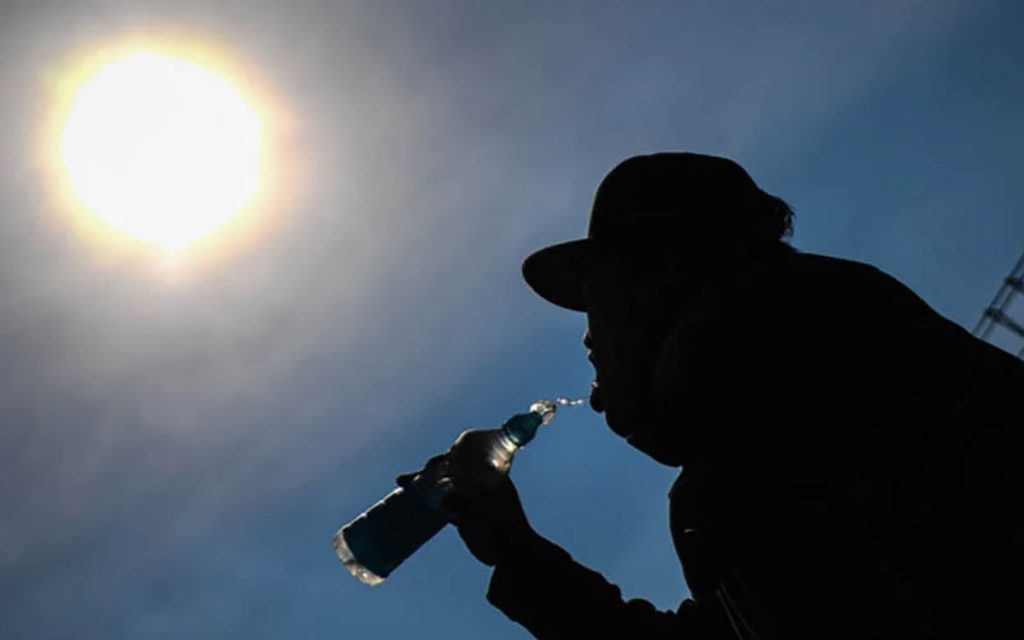The Bahamian heat can be harsh, especially in summer.
Learn how to recognize, prevent, and treat heat-related illnesses.
Our illustrious country is known for its beautiful beaches, warm weather, and endless sunshine, making it the perfect place to relax and enjoy outdoor activities.
However, with high temperatures and humidity, there’s also an increased risk of heat-related illnesses, such as heat stroke and dehydration.
Whether you’re a resident or a visitor, it’s essential to understand how to protect yourself from extreme heat, recognize the warning signs of dehydration, and take preventive measures to stay safe under the sun.
Understanding Heat Stroke & Dehydration
Heat stroke and dehydration occur when the body loses too much fluid and struggles to regulate its temperature. If left untreated, these conditions can lead to severe complications, including organ damage or even death.
What is Dehydration?
Dehydration happens when the body loses more fluids than it takes in, affecting essential body functions.
What is Heat Stroke?
Heat stroke is the most severe heat-related illness and occurs when the body temperature rises to dangerous levels (above 103°F/39.4°C), leading to potential damage to the brain and internal organs.
💡 Did You Know? The combination of high temperatures, humidity, and prolonged sun exposure increases the risk of heat stroke, especially in the Bahamas.
Who is Most at Risk?
While anyone can suffer from heat-related illnesses, certain groups are more vulnerable, including:
👶 Infants & Young Children – Their bodies can’t regulate temperature as well as adults.
👴 Elderly Individuals – Reduced ability to adapt to heat.
🏃 Athletes & Outdoor Workers – Increased physical activity leads to excessive sweating.
🏝️ Tourists & Visitors – Unaccustomed to the tropical heat and humidity.
💊 People with Medical Conditions – Those with heart disease, diabetes, or taking certain medications may be more prone to dehydration.
💡 Tip: If you fall into any of these groups, take extra precautions when spending time outdoors.
Warning Signs & Symptoms to Watch For
Recognizing the early signs of heat stroke and dehydration can prevent a medical emergency. Signs of Dehydration include:
🚱 Dry mouth & extreme thirst
🚶 Fatigue & dizziness
🛑 Dark yellow urine or reduced urination
🤕 Headaches & confusion
💢 Muscle cramps
Signs of Heat Stroke (Medical Emergency! 🚨)
🌡️ High body temperature (above 103°F/39.4°C)
🫠 Hot, red, or dry skin (no sweating)
💫 Dizziness, confusion, or fainting
💔 Rapid heartbeat & difficulty breathing
🤮 Nausea or vomiting
💡 Tip: If someone shows signs of heat stroke, seek medical attention immediately and move them to a cool place while waiting for help.
How to Prevent Heat Stroke & Dehydration in the Bahamas
💧 Stay Hydrated
✅ Drink at least 8-10 glasses of water daily, more if you’re active.
✅ Opt for coconut water or electrolyte drinks to replace lost minerals.
✅ Avoid alcohol, caffeine, and sugary drinks, which can cause dehydration.
🏖️ Limit Sun Exposure
✅ Avoid direct sunlight between 10 AM – 4 PM when the sun is strongest.
✅ Seek shade under umbrellas, trees, or shelters when outdoors.
✅ Wear light-colored, breathable clothing to stay cool.
🧴 Protect Your Skin & Body
✅ Apply sunscreen (SPF 30+), reapplying every 2 hours.
✅ Wear a wide-brimmed hat & sunglasses for extra protection.
✅ Use a cool, damp cloth on your neck and wrists to regulate body temperature.
🏃 Modify Physical Activity
✅ Exercise in the early morning or late evening when it’s cooler.
✅ Take frequent breaks and cool down in the shade.
✅ Never ignore symptoms of dizziness, nausea, or extreme thirst—stop immediately and hydrate.
💡 Tip: If you work outdoors, schedule regular breaks in the shade and drink water throughout the day.
What to Do If You Experience Heat Exhaustion or Dehydration
If you or someone else starts experiencing symptoms of dehydration or heat exhaustion, take action immediately.
🚨 If You Feel Dehydrated or Overheated:
✔️ Move to a cooler area (indoors or shaded spot).
✔️ Drink cool water or electrolyte-rich fluids.
✔️ Remove excess clothing and apply cold compresses.
✔️ Rest and allow your body time to recover.
🚑 If Someone Shows Signs of Heat Stroke:
❌ DO NOT wait for symptoms to worsen—call 911 or seek emergency care immediately.
✔️ Move the person to a cool place and lay them down.
✔️ Apply cool water to the skin and use a fan.
✔️ DO NOT give fluids if they are unconscious or disoriented.
💡 Tip: Heat stroke is a medical emergency. Immediate action can save a life.
Special Tips for Children & Seniors
👶 For Children:
🍼 Keep babies out of direct sunlight and well-hydrated.
🎽 Dress them in light, breathable fabrics.
🚼 Never leave children alone in a parked car—temperatures rise dangerously fast!
👴 For Seniors:
🪑 Encourage indoor activities during peak sun hours.
🚰 Drink water regularly, even if you don’t feel thirsty.
🏡 Keep indoor spaces ventilated and cool with fans or air conditioning.
💡 Tip: Check on elderly family members and neighbors during extremely hot days to ensure they are staying hydrated and cool.
Stay Safe & Enjoy the Bahamian Sun!
The sun is one of the Bahamas’ greatest assets, but taking precautions against heat stroke and dehydration is crucial for enjoying the outdoors safely.
Whether you’re relaxing on the beach, working outside, or playing sports, stay hydrated, dress appropriately, and listen to your body to avoid heat-related illnesses.
📅 Need medical advice or treatment for heat-related illnesses? Visit FMC for hydration therapy, sunburn treatment, and personalized health recommendations.

